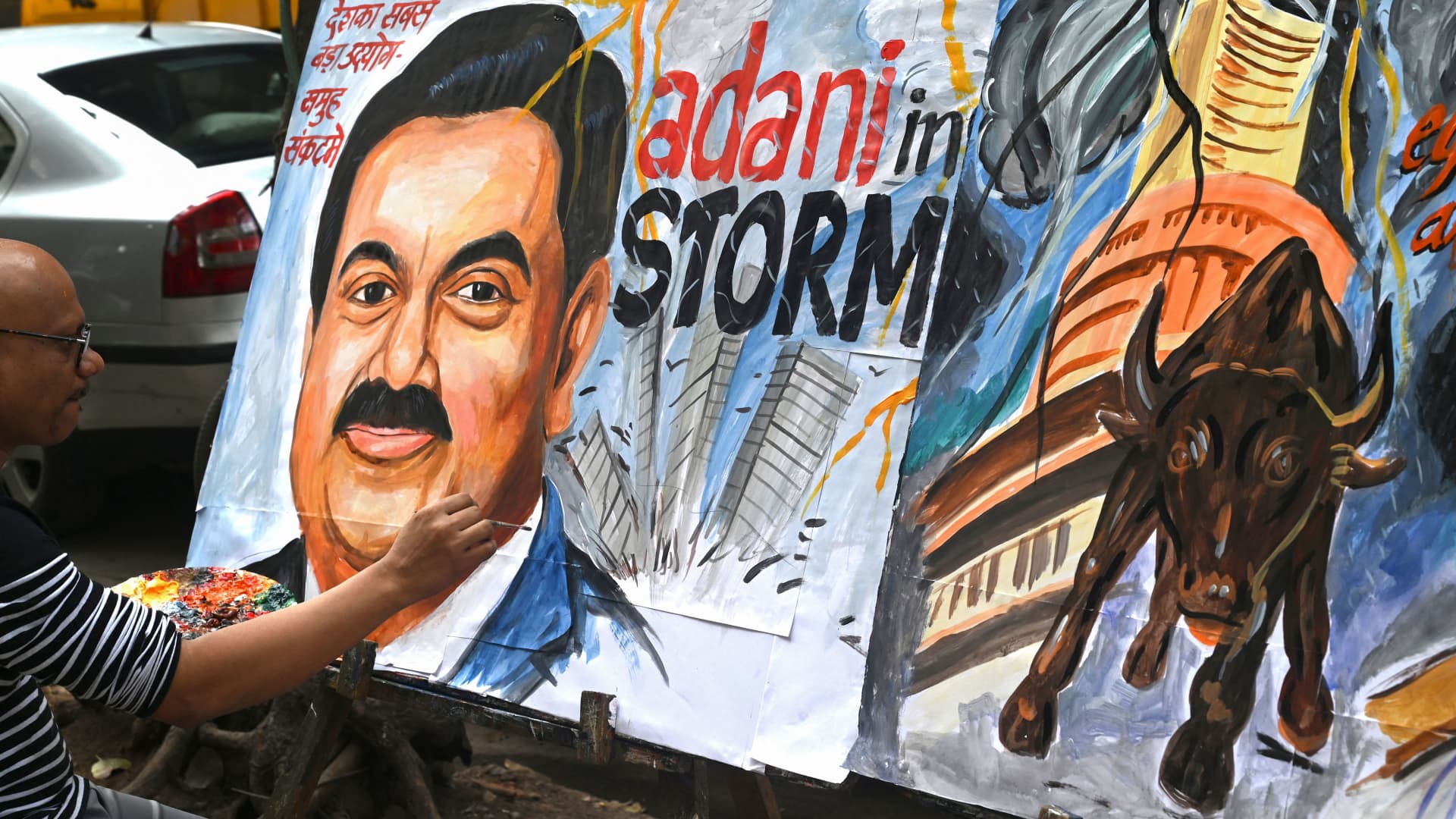Adani rout deepens despite soothing words from India’s government and billionaires

Art school teacher Sagar Kambli gives final touches to a painting of Indian businessman Gautam Adani (L) highlighting the ongoing crisis of the Adani group in Mumbai on February 3, 2023.
Indranil Mukherjee | Afp | Getty Images
Shares of most Adani Group companies fell further on Monday, continuing to drop as a feud between the conglomerate and short-seller firm Hindenburg deepened.
Adani Enterprises lost 4%, and Adani Transmission fell 10% in Mumbai’s morning session. Adani Green Energy, Adani Power and Adani Total Gas fell 5% each. Adani Port and Special Economic Zone bucked the trend and traded 2% higher, but they remained volatile.
Bernstein warned there will be more pain ahead in its latest “India Strategy” report.
“There will be more volatility in India this year; hence the market is prone to a correction,” analyst Venugopal Garre wrote in a Monday note. “The best way to pick up such transactions is to look for arbitrages in implied growth.”
Goldman Sachs echoed the likes of Nomura and HSBC in saying that the latest developments are unlikely to result in a spillover effect for the wider Indian stock market.
“We believe credit concerns are likely to be idiosyncratic in nature and are less likely to have broader contagion or systemic issues for the India offshore credit market,” Goldman Sachs analysts Kenneth Ho and Chakki Ting said in a Friday note.
They noted uncertainties surrounding Adani, saying its outstanding U.S. dollar bonds may hurt investor sentiment, but those concerns will be “unlikely to have a broader contagion impact.”
Adani Group’s total gross debt reached 2.2 trillion Indian rupees ($26.8 billion) as of end-March in 2022, according to the latest statement it’s released in response to Hindenburg accusations of stock manipulation and fraud.
The group is likely to scrap plans to raise roughly $500 million in overseas bond sales and will “explore other financing options” instead, India’s Economic Times reported.
Meanwhile, the Bloomberg Billionaires Index showed founder and Chairman Gautam Adani’s net worth fell further on Friday. His personal wealth has more than halved so far this year, down by 51.1%, or $61.6 billion.
‘Resilient and stable’
The Security and Exchange Board of India over the weekend aimed to defend Indian markets – saying the country’s two main indexes have demonstrated “ongoing stability” and are “continuing to function in a transparent, fair and efficient manner.” The Sensex is the benchmark index of the BSE — formerly the Bombay Stock Exchange — and the Nifty 50 is the flagship index of the National Stock Exchange of India.
“SEBI is committed to ensuring market integrity and to ensuring that the markets continue to have the appropriate structural strength to function in an uninterrupted, transparent and efficient manner as has been the case so far,” it said in a statement.
Gautam Adani, chairman of Adani Group, speaks during the Forbes CEO Summit in Singapore, on Tuesday, Sept. 27, 2022.
Bloomberg | Bloomberg | Getty Images
Without mentioning Adani companies by name, the regulator noted “unusual price movements in the stocks of a business conglomerate,” adding that it is monitoring those moves.
The regulator mentioned the Additional Surveillance Measure (ASM) framework – which compiles a list of companies about which the regulator advises investors to be “extra cautious while dealing in these securities,” according to the National Stock Exchange of India.
Several Adani Group-affiliated companies are included on the ASM framework’s long-term and short-term list, according to a notice on the NSE’s website updated Monday.
Adani Power is included on the long-term list, while Adani Enterprises, Adani Green Energy, Adani Ports and Special Economic Zone, Adani Transmission and Adani Total Gas are on the short-term list.
SEBI’s message of stability followed that of India’s central bank on Friday. The Reserve Bank of India said that “the banking sector remains resilient and stable,” citing its own assessment of the situation. It added that it will continue to monitor the stability of the industry.
“Various parameters relating to capital adequacy, asset quality, liquidity, provision coverage and profitability are healthy,” the RBI said in a Friday statement. “Banks are also in compliance with the Large Exposure Framework (LEF) guidelines issued by the RBI.”
Indian billionaires weigh in
Anand Mahindra, the chairman of Mahindra Group, defended India’s economy despite the whirlwind of recent media coverage surrounding Adani Group.
“I’ve lived long enough to see us face earthquakes, droughts, recessions, wars, terror attacks,” he said in a tweet on Saturday, without mentioning Adani Group by name.
“All I will say is: never, ever bet against India,” he said.
Fellow billionaire Uday Kotak, CEO of Kotak Mahindra Bank and India’s wealthiest banker, also tweeted over the weekend: “I do not see systemic risk to Indian financial system from recent events.”
He noted large Indian companies “rely more on global sources for debt and equity finance,” adding that it leads to challenges and vulnerabilities.
“Time to further strengthen Indian underwriting and capacity building,” he said.
– CNBC’s Michael Bloom contributed to this report.








